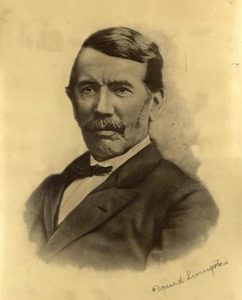
David Livingstone
*David Livingstone was born on this date in 1813. He was a white-Scottish physician, Congregationalist, and Christian missionary.
He was born in Blantyre, South Lanarkshire, Scotland, and grew up in a single tenement room with several siblings. He started working at a cotton mill company as a child and would follow his long work schedule with schooling during evenings and weekends. He eventually studied medicine in Glasgow before training with the London Missionary Society for a year. He completed his medical studies at various institutions 1840 in London, England. In the official role of a "medical missionary," he set forth to Africa, arriving in Cape Town, South Africa, in March 1841. A few years later, he married Mary Moffat; the couple would have several children.
He was an African explorer and one of the most popular British heroes of the late 19th-century Victorian era with the London Missionary Society. He had a mythic status that operated on several interconnected levels: Protestant missionary martyr, working-class "rags-to-riches" inspirational story, scientific investigator and explorer, imperial reformer, anti-slavery crusader, yet an advocate of British commercial and colonial expansion.
The latter two are contradictory, considering Brittan’s role in the Middle Passage and their timeline leading into the 20th century. Livingstone's recognition as an explorer and obsession with learning the sources of the Nile River was founded on the belief that if he could solve that age-old mystery, his fame would influence him to end the East African Arab-Swahili slave trade. "The Nile sources," he told a friend, "are valuable only as a means of opening my mouth with power among men. It is this power [with] which I hope to remedy an immense evil."
His subsequent exploration of the central African watershed culminated in the beginning of European geographical colonial penetration of Africa. Livingstone wrote about a group of slaves forced to march by Arab slave traders in the African Great Lakes region when he was traveling there in 1866: We passed a slave woman shot or stabbed through the body and lying on the path: a group of men stood about a hundred yards off on one side, and another of the women on the other side, looking on; they said an Arab who passed early that morning had done it in anger at losing the price he had given for her because she was unable to walk any longer. 27th June 1866 - Today, we came upon a man dead from starvation, as he was very thin. One of our men wandered and found many slaves with slave sticks on, abandoned by their masters from want of food; they were too weak to be able to speak or say where they had come from; some were quite young.
He also described: The strangest disease I have seen in this country seems really to be broken-heartedness, and it attacks free men who have been captured and made slaves... Twenty-one were unchained, as now safe; however, all ran away at once, but eight, with many others still in chains, died three days after the crossing. They described their only pain in the heart and placed the hand correctly on the spot, though many think the organ stands high up in the breastbone.
Livingstone's letters, books, and journals did stir up public support for the abolition of slavery; however, he became dependent on assistance from the very slave-traders whom he wished to put out of business. He was a poor leader of his peers and ended up on his last expedition as an individualist explorer with servants and porters but no expert support around him. At the same time, he did not use the brutal methods of maverick explorers such as Henry Morgan Stanley to keep his retinue of porters in line and his supplies secure.
For these reasons, he accepted help and hospitality from 1867 onwards from Mohamad Bogharib and Mohamad bin Saleh (also known as "Mpamari"), traders who kept and traded slaves, as he recounts in his journals. They, in turn, benefited from Livingstone's influence with local people, which facilitated Mpamari's release from bondage to Mwata Kazembe. Livingstone was furious to discover that some of the replacement porters sent at his request from Ujiji were slaves. Some of his figures on slaves have, however, been criticized as highly exaggerated.
David Livingstone died on May 1, 1873. At the same time, his missionary travels, "disappearance," eventual death in Africa , and subsequent glorification as a posthumous national hero in 1874 led to the founding of several major central African Christian missionary initiatives carried forward in the era of the European "Scramble for Africa." Known as the Berlin Conference.